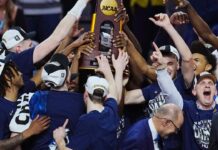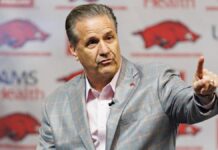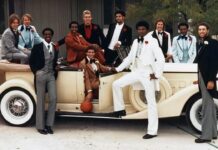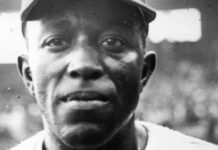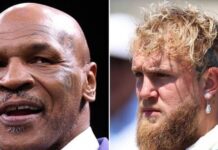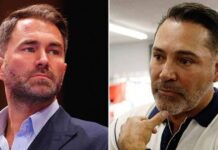Gregor Gillespie was four months removed from his knockout loss to Kevin Lee when he traveled to upstate New York for a visit with his doctor after suffering a broken jaw in the fight.
After his appointment with the physician, Gillespie hit the ski slopes and then returned to the hotel bar later that night to have some drinks with friends. While he’s not the most outspoken fighter on the UFC roster, he is still a top-15 ranked lightweight, which does get him recognized in public places.
After sitting down, the bartender decided to give Gillespie a shout out by announcing his arrival to the rest of the patrons. The date was March 15, 2020.
“I was at the bar hanging out with my buddies between time up and down the mountain,” Gillespie explained during the UFC Vegas 22 virtual media day. “The bartender knew that I was a fighter and she was saying, ‘Hey everyone, this is UFC fighter, blah, blah, blah,’ and that was on a Sunday, and they were replaying the fight from the night before, which was Kevin Lee vs. [Charles] Oliveira, and of course, that was Kevin Lee’s last fight.
“So right as she’s telling everyone that I’m a fighter, the highlight of Kevin Lee knocking me out comes on TV.”
By that point, Gillespie had already been subjected to multiple viewings of the knockout, which took away his undefeated record and left him motionless on the canvas for several moment after Lee connected with the thunderous kick.
Watching it again in such a public setting just after he was announced to the bar as a UFC fighter may have been embarrassing. But by that point, Gillespie understood that he was never going to completely escape that loss, even if he had already moved beyond it in his own mind.
“I think unfortunately, I’m going to be a highlight reel for Kevin Lee forever, and listen, if you fight long enough things like that happen,” Gillespie said. “I don’t think I took too long to get over that.
“It’s something that happened. It’s part of my fighting experience, and we’re going to do everything we can to not let that happen again.”
In terms of technique, Gillespie and his coaches addressed the shortcomings in that fight once he was cleared to return to action.
When it comes to the mental scars that sometimes come along with a brutal loss, Gillespie only needed to think back to a lesson his head coach at Edinboro University had taught him while he was becoming a four-time All-American wrestler and 2007 National Champion.
“My college coach Tim Flynn told me this a long time ago — whether you win or whether you lose, you have to have amnesia,” Gillespie said. “I remember those were his exact words. So if you come off a really good win, you can’t just sit there and celebrate and pat yourself on the back because the next round, you’ve got another killer who’s trying to take you out.
“If you lose and then go back to the wrestle backs and try to beat another good guy and try to get on the podium, you can’t dwell on the loss that you just had either. You have to have amnesia about your last round or your last fight.”
Because Gillespie spent so much of his life on the wrestling mats, he’s experienced defeat plenty of times over the course of his athletic career. So there’s little chance he’d ever let what happened against Lee define how he’s going to perform in his return to action at UFC Vegas 22 on Saturday at UFC APEX.
The biggest difference between the losses in wrestling and his first professional defeat in MMA is that Gillespie has been forced to simmer a lot longer before having the chance to erase the bad taste from his mouth.
“I had double digit losses in my high school career,” Gillespie said. “I had double-digit losses in my college career. This is not the first time I’ve had to come back from a loss. People that really are involved in the sport probably do understand, but for anyone that doesn’t the difference between losing in wrestling and then losing in fighting is the fact — and this can be a double edged sword, it’s a blessing and a curse — but typically when you lose in wrestling you’re going wrestle again that same day or the next day, and you can kind of redeem yourself and feel OK, or more OK about the loss relatively quickly. If you lose in wrestling, the next day or the next round, if you beat a good guy, it’s a little damper on the loss from the previous round.
“In fighting, you’re waiting months – years in this case. A year or so in this case before you can even attempt to redeem yourself. So yeah, that’s the tougher part about fighting. You’re only as good as your last performance, and you’ve kind of got to wait a while before you can redeem yourself in most instances in fighting.”
With a fight against rising lightweight contender Brad Riddell scheduled as the co-main event this weekend, Gillespie is anxious for a little bit of redemption. But don’t expect him to suddenly change the way he fights just because he lost by knockout the last time out.
Instead, Gillespie will happily tell his opponent the game plan, and it’s up to Riddell to stop him.
“I think most guys at this point in my career, especially the ones that I’ve fought already, they’re going to try to stop my takedowns and hit my on our feet or kick me on our feet,” Gillespie said. “It’s no different than the last seven fights I’ve had in the UFC.
“No one really wants to do the grappling exchange with me. That’s always been the case from the local promotions up through my fights in the UFC. It’s no different. I’ve got to get to where I’m good and that’s no secret either. Same game plan as always. Watch my first six fights, that’s what I’m looking to do.”





















